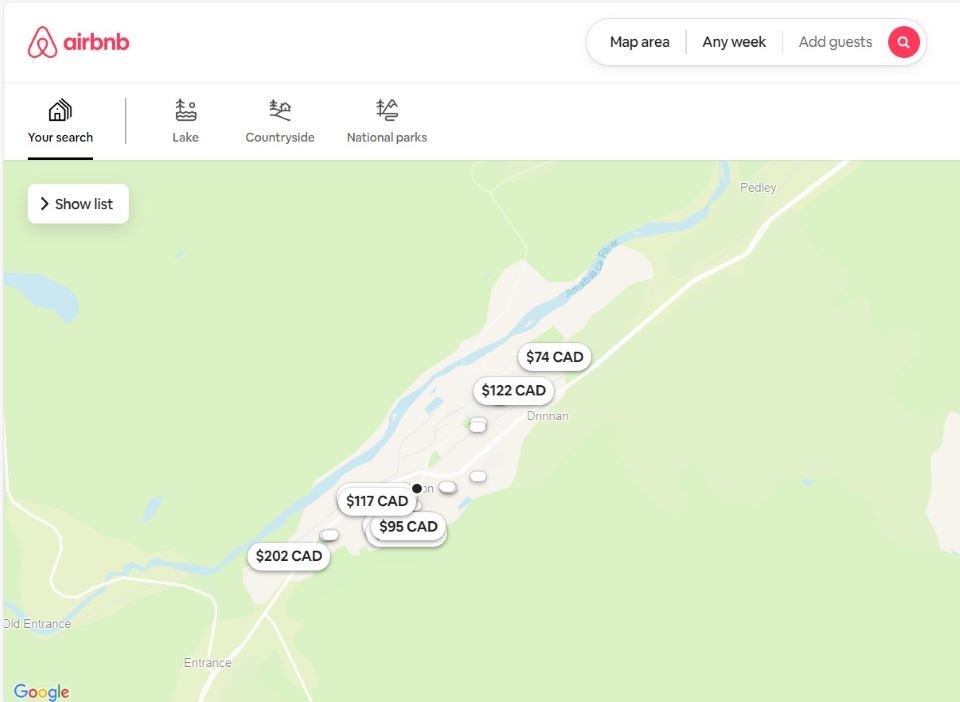HINTON – The Town of Hinton will only allow 130 short-term rentals, such as Airbnbs or VRBOs, that are non-principal residences to ensure the availability of affordable housing.
Council gave third reading to the bylaw on Tuesday (Nov. 5). A 100-unit cap was initially proposed, but council raised it to 130 to accommodate existing operators.
Coun. Stuart Taylor first attempted to amend the motion to increase the cap to 200, but it was defeated. He asserted this number of short-term rentals (STRs) would have little impact on rental rates.
“And by having a higher cap, hopefully, it gives council a little room for those who are in favour of town growth and the economic benefit of STRs,” Taylor said. “A hundred STRs in town has got an economic benefit potentially in a couple million, and we need those benefits and extra taxes to pay for services.”
Coun. Ryan Maguhn said he would support an increase but thought 200 was too high and made a motion for a 160-unit cap. This was also defeated.
“I think what council is really striving for here is trying to find a happy compromise between a high and a low number,” Maguhn said.
He noted there were currently 130 short-term rentals in non-principal residents, and should the bylaw pass with a 100-unit cap, 30 operators will be left out.
“I would much rather give them a chance to be brought into this current bylaw fairly and also give that small room for growth,” he said, adding council could revisit the issue in the future.
Coun. JoAnn Race said she wanted to see how the licence fee would impact demand before reconsidering the cap.
Coun. Albert Ostashek noted he had been comfortable with 130 as it covered all existing operators but couldn’t support 160.
“That’s potentially another 30 starter homes that are taken off the market, [or] conventional rentals or young families who need to live here because they need to work here or be here for any number of reasons,” Ostashek said.
Maguhn eventually moved for a 130-unit cap. This was passed 6-1, with only Mayor Nicholas Nissen opposed.
Town administration will track licensed short-term rentals until the cap is met and will then begin a waitlist. Any unlicensed properties will be fined. The Town would also hire an identification service.
Under the bylaw, apartment buildings are excluded as short-term rentals to reserve these properties for residents.
Council sticks with $1,500 licence fee
Council also passed amendments to the business licence and fee bylaws since all three bylaws are interconnected.
One proposed amendment would have lowered the business licence fee for non-principal residences from $1,500 to $165, the same as the fee for principal residences, but council ultimately voted 5-2 to stick with $1,500.
Maguhn advocated for this because these homes were essentially being utilized as a business within a residential area.
“I recognize that I have changed my position on this,” Maguhn said. “That’s because this is a delicate one, and it has sparked a lot of conversation with citizens that have approached me.”
Taylor argued there were other home businesses that don’t get charged a fee that high, and it wasn’t the job of the Town to protect hotels from competition.
Ostashek noted these businesses only had to pay residential property taxes, rather than commercial taxes, which was the original argument for setting the business licence fee at $1,500.
He added he may want to consider classifying these kinds of short-term rentals as commercial properties in the future.
“The difference is that the entire property is being used as the business,” he said. “In a traditional home-based business, it’s a portion of the property, and the homeowner lives in the rest of the property.”




